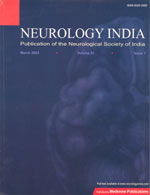
|
Neurology India
Medknow Publications on behalf of the Neurological Society of India
ISSN: 0028-3886
EISSN: 0028-3886
Vol. 59, No. 1, 2011, pp. 18-24
|
 Bioline Code: ni11005
Bioline Code: ni11005
Full paper language: English
Document type: Research Article
Document available free of charge
|
|
|
Neurology India, Vol. 59, No. 1, 2011, pp. 18-24
| en |
A comparative evaluation of nitrous oxide-isoflurane vs isoflurane anesthesia in patients undergoing craniotomy for supratentorial tumors: A preliminary study
Singh, Gyaninder P.; Prabhakar, Hemanshu; Bithal, Parmod K. & Dash, Hari H.
Abstract
Background : Neuroanesthesiologists are a highly biased group; so far the use of nitrous oxide in their patient population is concerned. We hypothesized that any adverse consequence with use of nitrous oxide should affect the patient so as to prolong his/her stay in the hospital. The primary aim of this preliminary trial was to evaluate if avoidance of nitrous oxide could decrease the duration of Intensive Care Unit (ICU) and hospital stay after elective surgery for supratentorial tumors.
Patients and Methods : A total of 116 consecutive patients posted for elective craniotomy for various supratentorial tumors were enrolled between April 2008 and November 2009. Patients were randomly divided into Group I: Nitrous oxide - Isoflurane anesthesia (Nitrous oxide-based group) and Group II - Isoflurane anesthesia (Nitrous oxide-free group). Standard anesthesia protocol was followed for all the patients. Patients were assessed till discharge from hospital.
Results : The median duration of ICU stay in the nitrous group and the nitrous-free group was 1 (1 - 11 days) day and 1 (1 - 3 days) day respectively (P = 0.67), whereas the mean duration of hospital stay in the nitrous group was 4 (2 - 16) days and the nitrous free group was 3 (2 - 9) days (P = 0.06). The postoperative complications in the two groups were comparable.
Conclusion : From this preliminary study with a low statistical power, it appears that avoidance of nitrous oxide in one's practice may not affect the outcome in the neurosurgical patients. Further large systemic trials are needed to address this issue.
Keywords
Complications, controversy, neuroanesthesia, nitrous oxide
|
| |
© Copyright 2011 Neurology India.
Alternative site location: http://www.neurologyindia.com
|
|
